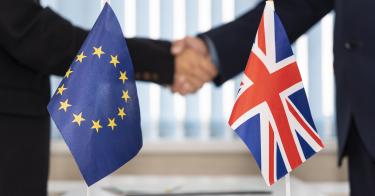The world watched in suspense when Donald Trump announced sweeping “Liberation Day” tariffs, and countries throughout the world rushed to negotiate. The first resulting trade deal was with America’s historic ally, the United Kingdom (UK). Publicly and privately, many hope that this will merely be an interim step toward the comprehensive agreement that President Trump offered the UK in his first term.
Yet those hopes faced a blow last month with the announcement of a trade deal between the UK and European Union (EU). Crucially for the UK, this agreement reopens the EU market for many UK food exports. Yet this market access came at a significant cost, whereby the UK agreed to work toward “dynamic alignment” with EU food and agricultural standards.
In laymen’s terms, the UK announced an ultimate goal to adopt EU regulatory standards, including future changes, for their own market, as the price of enabling agricultural trade with the EU. Critically, these provisions will be overseen by the European Court of Justice, and British courts will have no role.
This has obvious echoes with the “common rulebook” that former British Prime Minister Theresa May proposed in 2018 to allow “frictionless trade” with the EU after Brexit. This so-called “common rulebook” was in fact simply the EU rulebook, which the UK proposed to adopt, without the input and veto rights that they had when still part of the EU. Unhappiness with this proposal was a major driver in Theresa May’s fall from power; adopting EU regulations wholesale would beg the question of why the UK left the EU in the first place, and would leave the UK impotent in future trade negotiations.
>>> Europe’s Woke Trade Policies Threaten Transatlantic Ties
Such a regulatory stance would effectively render any trade discussions with the UK futile. Of course, at the time the British Government insisted that this approach did not make a U.S.-UK trade deal impossible, but President Trump publicly disagreed. If President Trump was right then, which he was, how could he be wrong now?
The recent U.S.-UK trade deal promises to create a potential $5 billion market access opportunity for U.S. exporters in the UK market by lowering UK tariffs on certain U.S. products. However, the biggest obstacles to U.S. trade with the EU and UK are not tariffs at all, but rather non-tariff barriers, especially for agriculture. Globally, agriculture has been one of the U.S.’s most successful export sectors, boasting an overall agricultural trade surplus until 2019.
Yet U.S. farmers have long struggled to trade on equal terms with the EU, with a bilateral agricultural trade deficit emerging in the late 1990’s. Today, more than half of our net at $32 billion agricultural trade deficit is attributable to the EU. in 2024.
Policymakers watched helplessly for decades as the agricultural trade surplus with the EU dwindled and then reversed, and as the deficit then worsened, not because of high tariffs, but because the EU uses regulatory standards to exclude competitive U.S. products. Most famously, the EU uses safety standards to prohibit imports of chlorine-washed chicken and hormone-treated beef, effectively banning whole sectors of U.S. agricultural exports. Ever wonder why food is so much more expensive there?
If you think that you must have missed reports of Americans getting sick from eating chicken and beef, think again. There is no scientific evidence that U.S. meat is less healthy, so the EU created a so-called “precautionary principle” to justify banning U.S. food products on health grounds, even absent scientific evidence.
>>> A Critical Mineral in a Critical Moment: The Antimony Crisis
Similarly, the EU uses “Geographical Indications” to effectively prohibit whole classes of products being sold from outside the EU. Many cheeses and wines, for example, cannot be made outside the EU, even when the place of origin is clearly stated on the label. The EU then outlaws non-geographic adjectives used to describe these goods.
So, for example, not only is wine labeled as “California Champagne” banned, but such producers are not even allowed to mention the “méthode champenoise” on the label. Without even being able to describe products to consumers, how can they possibly be sold?
There will be no point discussing these issues with the UK, if they simply follow the EU rulebook. Many will argue that the UK and U.S. could still achieve a trade deal in other sectors, given extensive trade in legal and financial services between our countries, along with pharmaceuticals, automobiles, and a host of other products.
Yet how does the Senate get to 51 votes without farm state senators? And what does the U.S. gain from a “comprehensive” trade agreement that excludes one of our most vital export sectors, due to a UK commitment to follow a different party’s laws?
The world hasn’t changed that much since President Trump declared that the UK’s proposed “common rulebook” would prevent a free trade agreement with the U.S. Then as now, any UK commitment to observe the EU’s protectionist agricultural standards would smother comprehensive U.S.-UK trade talks before they start.
This piece originally appeared in RealClear World



